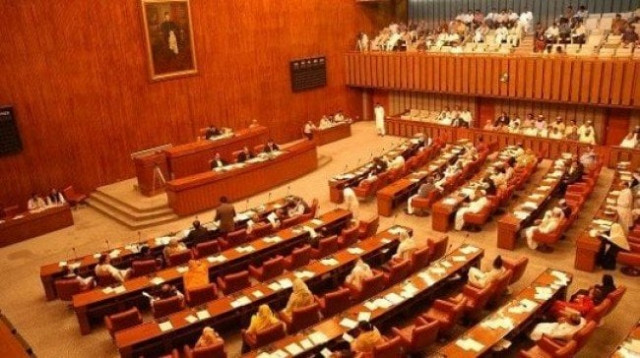JUI-F opposes presidential reference on Senate open-balloting in SC
Requests SC to declare reference non-maintainable, based on malice and an attempt to undermine parliament

Jamiat Ulema-e-Islam - Fazl (JUI-F) requested the Supreme Court (SC) on Monday to declare the incumbent government's presidential reference on open balloting in Senate elections as non-maintainable, based on malice and an attempt to undermine parliament.
The Pakistan Tehreek-e-Insaf's (PTI) government has filed a presidential reference with the apex court seeking its guidance regarding amending the Election Act, 2017 through an ordinance to allow the use of open-ballots in the upcoming Senate election.
The JUI-F's counsel Kamran Murtaza submitted a reply before the five-judge larger bench, headed by Chief Justice of Pakistan (CJP) Gulzar Ahmed.
Senator Raza Rabbani also appeared before the bench and opposed the presidential reference. He will also submit his reply.
The JUI-F, in its reply, maintained that the question in the reference was not bonafide as "it carries an inference, not in good faith, lacks jurisdiction and is meant to bypass the parliament, therefore, is liable to be declared as such".
The party's statement observes that the "Jamiat Ulema-e-Islam, being amongst the registered political parties of Pakistan and having a direct stake in not just the Senate elections but on the sanctity of the Constitution, parliament and democracy".
As per the JUI-F's statement, "the question in reference carries an inference that the elections of the Senate are not elections held under the Constitution. The question infers that the Senate elections are held under the Elections Act 2017, which is enacted pursuant to Article 222, read with Entry 41, Part 1, Fourth Schedule of the Constitution".
It further maintains that "the reference under the reply of paragraph 10 states that elections of the President of Pakistan are held “under” the Constitution, however, Entry 41 in Part 1 of Fourth Schedule of the Constitution also provides for election of president. The Elections Act 2017 does not state anywhere that it is enacted pursuant to Article 222 of the Constitution".
The reply maintained that bad faith in the reference was that "even if inference of the subject question is agreed with, Article 222 of the Constitution provides that Majlis-e-Shoora (Parliament) may by law, provide for the conduct of elections, however, the reference at paras 21 and 29 expressed the intention of the president to bypass the requirement of Article 222 by enacting an ordinance to amend Elections Act 2017 to require open ballot for Senate elections".
"The conduct of the Honourable President has been questionable ever since he assumed office. It has been established by now that he has misused his office time and again to promulgate Ordinances, which the Article 89 of Constitution expressly bars when National Assembly and Senate are in session, however, since the incumbent government did not have a majority in Senate, it used the mechanism of Ordinances to bypass the Parliament altogether. Ironically, the reference talks about the confidence of people in the democratic process, the JUI-F stated in its reply.
It added that, "The conduct of the president also discussed when it filed a reference against an honourable judge of this august court, although the majority view held that malice could not be established behind the filing of reference, however, the reference was set aside."
It was also noted that "the reference exceeds the jurisdiction of Article 186 of the Constitution by giving merits of open ballots and stating the disadvantages of the secret ballot and also giving examples of the amendment in the Indian law for open ballot".
The opposition party further argued that "Under Article 186 of the Constitution, the court can give an opinion on a question of law referred to it rather than make an order or give a finding based on merits and demerits of facts".
The statement maintains that "the reference draws comparison to Senate elections with local government elections as this Honourable Court in Civil Appeals No. 760 & 765 of 2016 held that the Sindh government is competent to legislate law to hold elections either by show of hands or secret ballot. This comparison is deeply flawed as Article 140-A of Constitution provides that each province shall by law, establish a local government system and that the elections shall be held by Election Commission of Pakistan (ECP)".
As per the JUI-F's response, "Article 140-A has expressly granted powers to each province to legislate on local government system, hence it can be interpreted as not falling within the meaning of Article 226 of Constitution for elections held under the Constitution".
The statement further maintains that "the reference argues that if the Constitution had intended to apply the principle of secrecy of ballot for Senate elections, then it would have specified in Article 59 of Constitution as has been specified in Clause 12 of Second Schedule for election of president".
The hearing has been adjourned till Wednesday wherein the Attorney General for Pakistan will present his arguments.



















COMMENTS
Comments are moderated and generally will be posted if they are on-topic and not abusive.
For more information, please see our Comments FAQ